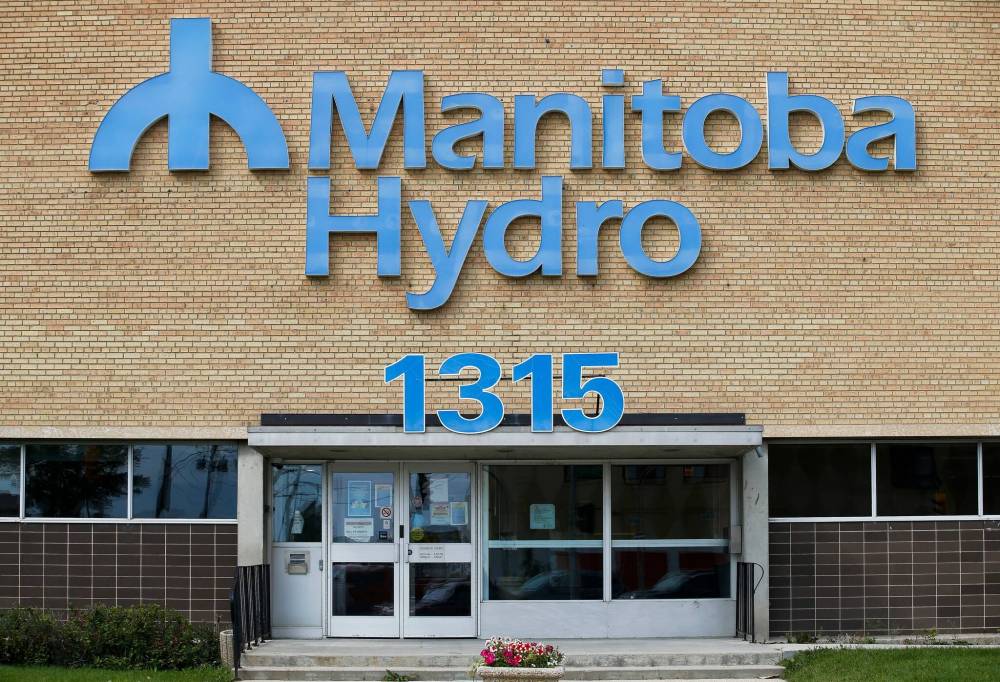
Manitoba Hydro’s steep decline in projected revenues this year is precisely why the NDP government should not interfere with the Crown corporation’s rate-setting policies.
Hydro is reporting a projected decline of $225 million in net revenues this year owing to low water levels, according to its first-quarter financial report released this week. It’s not an unusual occurrence. The Crown corporation’s revenues fluctuate on a regular basis, depending on factors outside its control, including weather and export market prices.
It could get worse: “Precipitation amounts for the remainder of the year can have a material impact on water conditions as well as the impact of market prices,” the report says.
JOHN WOODS / WINNIPEG FREE PRESS Manitoba Hydro is reporting a projected decline of $225 million in net revenues this year.
In a market as volatile as Hydro’s, the last thing the Crown corporation needs is government interfering with electricity rates, which the former Progressive Conservative government was guilty of and the new NDP government now plans to do.
Finance Minister Adrien Sala confirmed this week his government plans to make good on its election pledge to freeze rates for one year, despite Hydro’s revenue decline. Reducing the company’s revenues at a time when it’s struggling with low water is exactly why it’s a bad idea for government to interfere in rate-setting.
Unlike Crown corporations such as Manitoba Liquor and Lotteries, which transfers its profits to government for general revenues, Hydro keeps its net revenues. Profits and losses are calculated as part of government’s overall summary financial results, but the Crown corporation retains its net revenues to pay down debt and maintain cash liquidity (Hydro’s cash on hand has dropped significantly over the past year).
Hydro sets rates according to its financial needs, to avoid financial losses, repay debt and maintain a favourable credit rating.
The Crown corporation also has a duty to provide Manitobans with low electricity rates. That’s why rates are regulated by an independent body, the Manitoba Public Utilities Board, which approves and often alters Hydro’s proposed prices.
When governments interfere in that process for political reasons, it undermines the financial integrity of the company.
The NDP plans to pay for its rate freeze, estimated at $37.5 million, by reducing the debt guarantee fee Hydro pays to the province. The utility pays two fees to the province: the debt guarantee fee and a water rental rate (it also pays capital taxes and the payroll tax).
The two fees allow government to siphon cash from the Crown corporation. The province doubled both fees under former premier Gary Doer’s NDP government in the early 2000s (it also took an additional $203-million “dividend” from the company in 2003). The former Tory government reduced those fees last year.
Both fees should be eliminated entirely. Hydro’s mandate is to provide Manitobans with low-cost, reliable electricity, not fund the provincial government’s bottom line.
Climate change will likely result in greater fluctuations of water levels in the future, which will impact the company’s revenues. Hydro has to plan for those risks by reducing debt and building up its retained earnings. Government should not interfere in that process.
Hydro is owned by the province. It’s expected government will — through its appointed board of directors — be involved in big-picture decisions regarding the future of the company. What it should not do, though, is micromanage Hydro’s affairs, including rate setting. That should be left entirely up to Hydro and the PUB.
The NDP promised to freeze Hydro rates for a year to help Manitobans struggling with inflation. Affordability emerged as one of the top issues for political parties in polling and focus groups in the run-up to the Oct. 3 provincial election. All parties included measures to counter inflation in their campaign platform. However, there are more efficient ways to help those struggling with rising prices.
Freezing Hydro rates doesn’t just benefit low-income Manitobans, it provides higher-income people with a rate freeze they don’t need. That’s the problem when governments try to address economic challenges for lower-income people by providing tax breaks or rate reductions to everybody. It redirects resources from high-needs segments of society to low-needs (or no-needs) ones. It’s bad policy.
There are myriad options for government to provide relief to low- and middle-income Manitobans, including through programs such as rent assist and through the income tax system. Income-tested tax credits, such as the federal government’s GST tax credit, is one of the most effective ways of getting cash into the hands of those who need it the most without providing higher-income people with tax breaks or other government benefits they don’t need.
If there is one election promise the NDP should not proceed with it’s the misguided pledge to freeze Hydro rates. It was a bad idea during the election campaign and it’s an even worse idea now.

Tom Brodbeck
Columnist
Tom has been covering Manitoba politics since the early 1990s and joined the Winnipeg Free Press news team in 2019.
Read full biography


